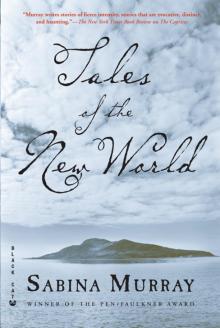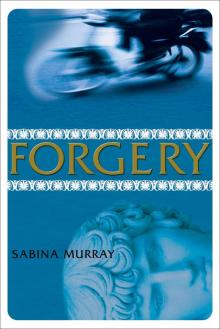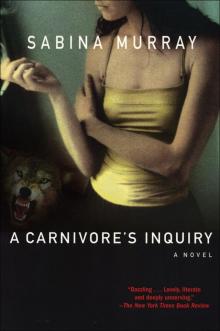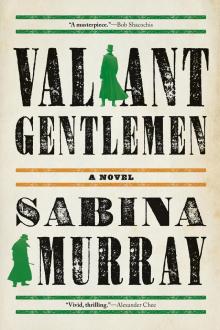- Home
- Sabina Murray
A Carnivore's Inquiry Page 5
A Carnivore's Inquiry Read online
Page 5
“What?” said Ann.
“Well, instead they eat each other. There’s some incidence of cannibalism. The cannibalism stands in for the fucking. It’s the lesser taboo.”
“Kind of like the other white meat?”
I nodded then reconsidered. “What are you talking about?”
“I don’t know,” said Ann. “Look, there’s Boris.”
Sure enough, Boris had materialized across the street. He was holding a bunch of flowers.
“Katherine,” said Ann, “do you and Boris...”
“Do we what?”
Ann sighed. “I want to ask you about your sex life, but I’d like to think that I’m above it.”
“It’s all right,” I said. “I mean it is Boris groaning and wriggling, smelling like an onion.”
“No need to be vulgar,” said Ann.
“Sex is vulgar,” I said. “Vulgarity is sex’s best quality. And if its too vulgar for you . . .”
“Well, I could always replace it with cannibalism,” said Ann.
The traffic stopped and Boris made his way across the street. He stopped in front of us and looked past the doorway into the still gallery. “Am I too late?” he asked.
Ann and I looked at each other, than back at Boris.
“Who are the flowers for?” I asked.
“They are for Ann,” he said.
“Then,” I smiled, “you are just in time.”
On the two-month anniversary of our meeting, Boris took me to the opera again, a production of Salome. It wasn’t very good, although I’m no judge of operas. I tend to go from aria to aria, set change to set change. I’ve noticed that I like operas where the tenor is bigger than the soprano, which isn’t all that often. And there were no recognizable arias in Salome, or any set changes. All the characters milled around a pit in the middle of the stage. From this pit would come righteous, howling baritone. Finally John the Baptist slunk onto stage, shaking his great hairy head at people. Then they decapitated him offstage and brought his head back glued to a platter. They’d done a good job with the head, the great drooping lips and meaty cheeks. The soprano sang to the head for close to half an hour. I looked over at Boris. He was tapping on the floor with his foot. His pants had ridden up and the sock on his right foot—a thin black nylon sock—had slid into his shoe. There was about a two-inch space of exposed fleshy ankle. I reached down, carefully, slowly, and pulled up Boris’s sock. Boris looked over at me but didn’t care, and soon—without much explanation—the opera ended.
“I’m hungry,” I said. “Let’s leave before the curtain call.”
That night we dined at Boris’s favorite restaurant. I ordered the osso buco. I ate quickly—although there was too much rosemary, which made the sauce taste metallic—and was happily sucking the marrow out of bones when I noticed Boris’s eyes trained on me with more than the customary intensity.
“What?” I asked.
Boris chuckled. “You’re still such a child, Katherine.”
“And what does that make you?” I asked. I smiled sarcastically.
“Lucky,” he said.
I’d become disillusioned with our relationship over the last week—something to do with Ann, or maybe the beguiling Perugino peering down at me while I drank my morning coffee. I was no longer satisfied and was trying to figure out how I’d managed to convince myself that I was. I had a roof over my head and food and entertainment, although it was all Boris’s idea of fun—I hadn’t been to a movie in months—but I was giving him the prime of my life. Maybe I even had reason to resent him. I ate my food quietly. Boris had met with his lawyer the previous week. I’d asked if it had something to do with book contracts, but he’d denied this. His agent took care of all that. He’d been smiling in an annoying, patronizing way and it occurred to me that he might have changed his will. Maybe he’d made me a beneficiary, or sole beneficiary. I didn’t know how much Boris was worth, but he wasn’t a big spender. Soulless Man had been in print for more than fifteen years, although none of his other books had done as well. One—The Drowning Boy—had been made into a movie.
“Boris, why did you see your lawyer last week?” I asked.
“Oh, the usual,” he said.
“But you don’t usually see your lawyer.” The waiter appeared to refill the water glasses and Boris and I were momentarily silent.
“Why this sudden interest?”
“You worry me when you don’t tell me things,” I said. “People go to their lawyers to arrange wills. People arrange their wills when they’re,” I paused here for effect, “when they’re ill, Boris.”
Across the room a woman was laughing maniacally. Boris chewed in silence. He was old enough to have a heart attack, but in the two months I’d been watching him, his health seemed to have improved. I wondered if there was a cyst blocking something that was responsible for the rosy glow—a glow that we would later attribute to blood clogged up in his face.
“How’s your health?” I asked him.
“I’ve never felt better,” he replied.
“Do you ever think about death?” It had occurred to me that Boris might one day become suicidal. Maybe I could drive him to it. I’d seen Gaslight on cable late the night before. “Sometimes it seems easier to end it all.”
Boris looked at me with a fatherly expression.
“One day you could just die, Boris,” I smiled. “One day, you’re working on a novel, the next you’re in a casket with neatly folded hands.”
Boris raised his eyes to me and tilted his head. He was studying my face. “Katherine, don’t be so dramatic.”
“Dramatic?”
“Are you depressed?”
“No,” I said.
“I can send you to a doctor. I hear the drugs are good. People like them.” He reached across the table and held my hand. “I understand that maybe I have been too busy and that you might feel neglected.”
“Oh, shut up, Boris,” I said, retracting my hand. “You don’t understand anything.”
“Is that productive?” Boris raised his eyebrows. He pursed his lips.
“You don’t know me.”
Boris shrugged. “Can anyone know another?” he said, which sounded like something I’d heard before, only stated in a better way.
“I know enough about you to know that I know enough about you,” I said. “I can’t stay here, with you, in New York, any longer. I think I’m losing my mind.”
Boris started looking annoyed. “Katherine, I can’t leave right now. I’m in the middle of a book.”
“Fascinating.” I smiled blandly. “So what’s the next Nobel Laureate writing? What’s The Little Vagrant about?”
Boris relaxed back into his chair. He seemed to think our equilibrium had just been restored. “You will like The Little Vagrant. It’s about a young woman in Italy. She is searching for security, for warmth, for someone to really care. Instead she meets careless man upon careless man. In the end she feels desolate.”
“Desolate?” I studied my hands on the tablecloth. “Boris, how could you?”
“How could I what?”
“I told you those stories in confidence.”
“What stories?”
“What were you thinking?” I stared in disbelief. “I find your marketing of my life in poor taste.”
“See? Childish.” Boris crossed one leg over the other, which took some effort, due to the girth of his thighs. “You automatically assume that the book’s about you.”
I was speechless.
“Yes, yes, admit it, Katherine.” He dismissed me waving his hand in the air. “There’s a bit of the narcissist at work here.”
I started to get dizzy. My hands were numb. I picked up my glass of wine, which I meant to drink, but I was clumsy, trying too hard to hold it. Suddenly, the glass exploded, sending shards flying. My hand was bleeding. I dropped the glass on the table. The wine had splattered all over the table. Boris was stunned, or maybe just embarrassed. The waiter came running. He stood
ready to dab any stain from any fine garment, ready to apologize for the accident—however it had happened—once it was explained, but Boris and I were silent.
“Settle the bill,” I said, and headed for the door.
That night we had a huge fight. Boris should have let me leave, as I’d intended. My things were easy to pack. I’d only acquired a silk shirt since I’d moved in, which crumpled into a tiny ball. He grabbed my elbow by the elevator. He got down on his knees, which was more terrifying than affecting. He begged me to stay. He told me that everything he owned was mine.
“Everything?” I shook him off.
“Yes.”
I had been right about the will.
Boris collapsed onto the floor, sitting on his big backside. He was out of breath. “How can you leave me? You are all that I have. You are my family, my arms, my legs.”
I was not me. I was Boris’s limbs. I let my bag drop to the floor. I looked longingly at the elevator, but I realized that I was past the point of valuing freedom. I’d gotten more mature, somehow, in the past couple of months and it had made me mercenary. Boris had his hands on my calves. The top of his head was shiny and, with the light shining right above us, I could see my distorted reflection on it. “I need my own money,” I said. “I don’t want to ask you for ten dollars every time I want cigarettes.”
“Of course.”
“I need to see friends, to do things on my own.”
“But you have no friends but me.” Boris looked at me pleadingly.
“I’ll make them.”
Boris nodded down at the carpet, its pattern of a trellis strangled by wild rose.
I reached out my hand and helped him stand. “We should go inside and get a drink, toast to our new beginning.”
“Maybe a celebration is in order,” he said. But from the tone in his voice, I knew that Boris had nothing to celebrate and that he was deeply regretting having told me about the will. He was also consoling himself by thinking that he could change it whenever he wanted. He must have been; something kept him civil. Boris decided that we should take a vacation to blow out the bad air. We picked up his battered VW Rabbit, which he kept parked by Ann’s apartment in Brooklyn, and drove north. Boris liked New England so we decided to head to Maine to see the last of the leaves.
6
Boris fell asleep right around Providence and I kept heading up I-95. The weather was glorious—cold and bright. I hadn’t driven in a while so it was novel and fun. My mind wandered back to school and for a brief half hour or so I committed to the idea of going back, of making peace with my father, of springing my mother, of graduating and becoming a productive member of society. I saw the buildings and the glass windows and brass knockers of a million residences and saw myself peering out, opening the door—heard my feet thudding along the old floorboards. And maybe I’d get married. And maybe I’d have children—a gorgeous dark-haired girl who would love me, ask me what to wear when she was teenager. Or maybe I’d have a loyal dog to warm my feet. I’d take up hiking. And all this if I could just get organized, reach an epiphany, and go back to school.
I’d left the highway without thinking. I’d taken the exit to Hingham and on automatic pilot, with Boris next to me in the front seat, was driving home. I didn’t even realize what I was doing until I was in the driveway of my house. I cut the engine and looked at sweep of lawns, the stacked-boulder fences, the piles of leaves that rustled in the light breeze and dusted a few leaves back across the grass. I saw that my father had finally taken the swing down from the oak tree, which I suppose was better. I’d never used the swing as much as my mother and she only really liked it during one of her episodes. I remembered once, I think I was seven, seeing her flying backward in her bathrobe, and then forward out of her bathrobe, and then in her bathrobe as she sawed through the early morning air.
A cardinal was yelling for its mate and squirrels were racing around, squabbling, but other than that the house was silent. My father would be in Boston so I wasn’t worried that he’d see me. And then I saw the figure in the bushes—a white shirt, jeans, the head in a scarf. I froze. Was it my mother?
And then he stood up.
Mr. Jones, his scarf a bandana left over from the seventies. His hands wrist-deep in muck. “Can I help you?” he called out.
I started the engine and began reversing out the drive. I saw Mr. Jones studying my face and then, recognition.
“Katherine!” he yelled. But I was already driving away.
Boris woke up. “Where are we?” he said sleepily.
“I’ve gotten us lost,” I said.
Boris peered out at the road squinting. He saw the town sign, welcoming us. “We are in Hingham,” he said. He pronounced “Hingham” as “hingHAM.”
“There’s a gas station,” I said. “I can use the restroom there.” But all I really wanted to do was have Boris take over the driving.
Boris wasn’t much of a vacationer. He didn’t want to get away from it all. He decided we’d stay in Portland. A small city he could handle. More nature than that terrified him; uninterrupted views—skies rather than skylines—gave him panic attacks. Portland was covered in fog. It was thick and ubiquitous, as though a cloud had fallen from the sky and would blanket the city until someone could return it to the heavens. The fog put me at ease in much the same way I suspect rabbits are at ease when the visibility is poor. I liked the knotty streets and uneven cobblestones. I liked the way the brick buildings slowly came into focus out of the haze, leaning on each other as tired and crooked as old men. Spires poked out of the cloud cover. Streets turned you around until you were lost in a web of oxbows and dead ends. Bells from unknown steeples pealed in the heavy air; horns sounded balefully from the bay; the scent of fish hung in dense, salty pockets on the quays.
Boris and I arrived in the early afternoon and spent the last part of the day wandering around the Old Port. There was some excitement in town about a killer who had escaped from a lunatic asylum a few miles away in a town called Gray. Every overheard conversation buzzed with talk of the madman at large—a William Selwyn—who had already been dubbed “Bad Billy.” All of this, or so I was informed by a portly woman who saw my newspaper as an invitation to conversation, was a tragedy as they had only apprehended Bad Billy three years previously, after his sixth murder. His last victim, a woman of twenty-two, had been caught unaware at the bathroom mirror. When they found her body, her left eyebrow was significantly thinner than the right, her hands fisted around a pair of tweezers.
This was all very interesting, of course, but the woman proved difficult to get rid of. I folded my newspaper into my lap. Wasn’t it unfortunate, she said, that her own safety should be so compromised? No single woman would be safe, because single women were, after all, what William Selwyn was after. She raised her trim eyebrows expressively.
“It excites you, doesn’t it?” I said. And she left.
Boris finally returned from the bathroom and announced that he was hungry. There would be, he assured me, on one of those dark and salty jetties, a fish shack where we could “sup” with the locals. Boris was now sporting a floppy Gilligan hat that he thought made him look like a fisherman. He found his seaman’s dive with the help of some neon arrows and a sign that depicted a lobster in a beard and yellow raincoat.
Boris and I were seated immediately. The restaurant was not a haunt for fishermen, but rather—judging from accents—people from New Jersey. Our waitress wore a hat, as did the entire wait staff, that had two foam lobster claws sticking out at the sides. Boris studied the menu. “What’s the house specialty?” he asked.
The lobster-cracking paraphernalia delighted Boris. He looped the plastic bib around his neck and tied it in a firm knot. He clacked the crackers menacingly at his dinner—a ruby lobster at rest on a bed of lettuce. “This is what I love about Maine,” he said. He waved around the restaurant and I regarded all the things included in his embrace: portrait of moose, papier mâché anchor, “Lord Give Me Patience,
and I Want It Now” framed in wooden blueberries. “Why aren’t you having the lobster?” he asked.
I regarded Boris’s dinner, which looked back at me, its black, stemmed eyes fixed in the final instant of the boiling pot. “I prefer eating closer to my species,” I replied. I had ordered the steak.
Boris went to work on the lobster with surgeonlike intensity, although his bib made him look like a baby. He lifted the creature in his two meaty hands and in one expert, juicy crack split the tail from the torso. “They say the best meat’s the tail, but I prefer these little morsels up in the body.”
I leaned to take a closer look and nodded politely. I felt one of my headaches coming on.
“Katherine, what’s wrong?” asked Boris.
“Migraine,” I said. “I’m going out for some air.”
I left the dining room and let the door slam behind me. Something about the lobster had set me off. Maybe I felt sorry for it, but that seemed unlikely. Even had it lived, its days of scraping about the ocean floor, occasionally raising a massive claw to menace a passing halibut, were not worth romanticizing. But I still felt sick. As I’d watched Boris and his generous jowls, the thought had occurred to me that Boris, like grilled fish, might offer the best eating in his cheek.
The day was closing. At five, the sun had sunk low and banks of purple cloud were stacked, one upon the other, on the thin, black line of the horizon. The air was heavy with fog and salt and quickly penetrated my wool sweater. There was no one around. I looked out at the waves. A stiff wind blew the water to a beaten metal sheet of regulated dimples and shallow depressions. It whistled through the riggings. The cold air had settled my head a little. I wasn’t really hungry. Boris was at work on his lobster, reading the newspaper that he had flat on the table beside him. I thought I should get some sinus medicine. Somewhere, in among the kite shops and hand-knit sweater stores, there had to be a drugstore.
I crossed a busy street and headed away from the water. Halfway up Exchange Street—where the majority of the quaint, tourist-oriented shops were located—a musician had set up with his violin. I always liked violin music and I stopped to watch him for a minute. The musician was tall and thin, and his hair stood in a fuzzy shock around his head. He had a long, lean face and he was smiling to himself, with his eyes closed. He smiled through the difficult parts. He was listening to the violin almost passively. I looked at the buildings, the long glass faces of the storefronts, the swinging wooden signs, the old-fashioned streetlights. All these things were painted over by the music and somehow made more beautiful.

 Tales of the New World: Stories
Tales of the New World: Stories Forgery
Forgery The Caprices
The Caprices A Carnivore's Inquiry
A Carnivore's Inquiry Valiant Gentlemen
Valiant Gentlemen